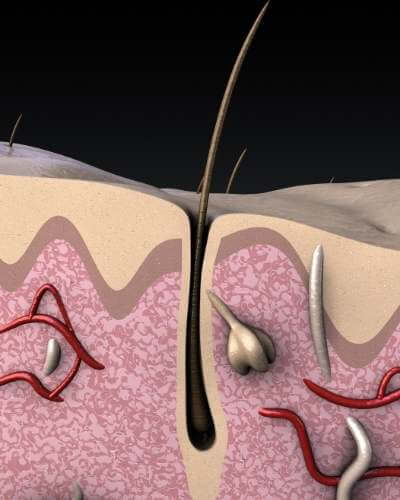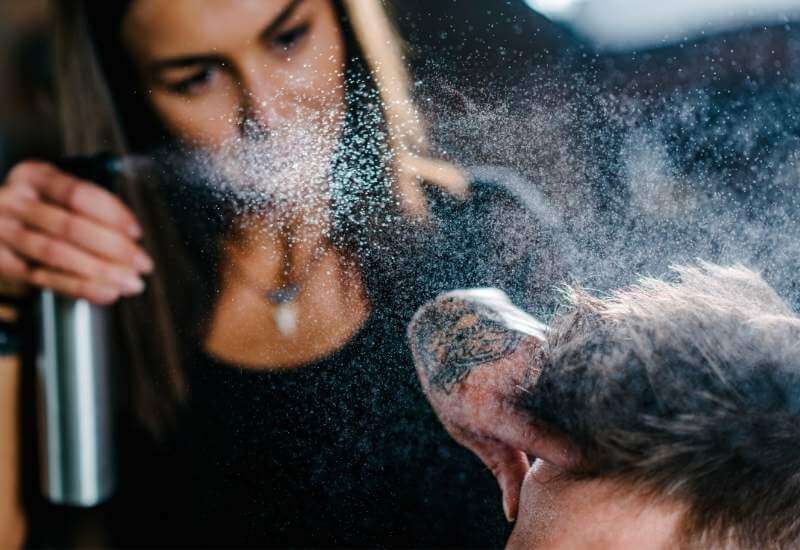Caffeine and coffee are superfoods for your hair and can improve hair health in a variety of ways. Decreasing hair damage, limiting hair fall, and encouraging hair growth are just a few of the benefits of coffee for hair. Today we are spilling the beans on caffeine and coffee and show how to use Caffeine for Hair Growth.
Table of Contents
What is Caffeine?
Caffeine is the world’s most widely used stimulant. Millions of people use it every day to promote alertness, reduce fatigue, and improve attention and focus. Caffeine is a naturally occurring chemical that can be found in the leaves, seeds, and/or fruit of over 60 South American, African, and East Asian plants. The coffee bean is the most well-known source of caffeine. Caffeine is caffeine, regardless of whether it comes from natural or synthetic sources, and all sources have the same basic qualities.
Caffeine as DHT Blocker

The androgen dihydrotestosterone promotes male physical traits. It is thought that it also causes hair follicles to shrink, causing them to grow hair more slowly or not at all. DHT affects both men and women, albeit it is more prevalent in men. Over half of all males will have had some hair loss due to DHT by the age of 50.
Over the last two decades, scientists have gained a better knowledge of the factors that cause hair loss. One of the most popular and efficient approaches to tackle the condition is to inhibit DHT in the scalp.
In various studies, Caffeine has been shown to be an effective suppressor of androgenetic alopecia (AGA), often known as male pattern baldness, in studies.
In one research, scalp biopsy samples from AGA patients were grown for 120-192 hours with varying doses of testosterone and/or caffeine.
Biopsies were obtained from 14 men ranging in age from 20 to 45 years old. The Norwood-Hamilton scale was used to classify each patient’s hair loss into Stages III and IV.
The grown hair follicles were divided into three groups:
- Caffeine group, which included various levels of caffeine.
- Control group, that had varied testosterone levels.
- And a combined group, which were cultivated in testosterone first and then in caffeine in various concentrations.
The follicles were extracted after 120 to 192 hours, and researchers measured hair shaft length to see if caffeine was effective.
The hair shaft grew longer as the follicle was exposed to caffeine for extended periods of time. There was a small variation in the elongation effects of the two concentrations (0.001 percent and 0.005 percent), but it was insignificant.
However, this was not the only discovery made by the researchers.
Surprisingly, hair follicles treated to caffeine showed positive and considerable elongation even after being subjected to testosterone. Caffeine was found to help prevent the effects of DHT in male hair follicles in another 2007 laboratory trial. It induced hair shaft elongation, resulting in hair roots that were longer and wider. It also increased the duration of anagen, the hair growth stage. (Source)
Caffeine has been shown in studies to help keep hair in the anagen phase, lengthen it, and encourage hair shaft elongation. Caffeine, when given topically to the scalp, has been shown in clinical studies to help stop hair loss and increase hair growth. Caffeine has also been researched to help with the treatment of androgenic alopecia, a hereditary disorder that causes a specific pattern of hair thinning on the scalp.
Check out some other best Ayurvedic Substitute for Minoxidil and DHT Blockers
Caffeine’s effect on Hair Follicles

Patients with androgenetic alopecia were investigated at the University of Lübeck in Germany (AGA). AGA is a type of hair loss that affects both men and women. For 120-192 hours, samples were cultured with various doses of testosterone and/or caffeine.
The study’s lead researchers, Elsner Fischer and Hipler, obtained biopsies of hair follicles from 14 male patients ranging in age from 20 to 45. Each patient had different levels of hair loss. To begin, they used varied quantities of testosterone to treat cultivated hair follicles, which, predictably, resulted in a slowing of hair growth. Then, in comparison to a control (placebo) group, they treated the identical hair follicles with varied caffeine dosages.
The results of this experiment revealed that not only did caffeine neutralize the deleterious effects of testosterone on hair growth, but it also improved hair growth when caffeine was administered to a hair follicle that had not been pre-treated with testosterone.
What’s more amazing is that hair follicles treated with caffeine continue to demonstrate faster hair growth than those not treated with caffeine after 120–192 hours. As a result, the effects of caffeine remain long after they are first applied.
Rather than passing via our digestive tract, influencing neurotransmitters, blood pressure, and maybe producing other detrimental and addictive effects in our bodies, topically administered caffeine stimulated hair follicles immediately, aiding hair loss and growth in this study.
How to use Caffeine for Hair Growth

While you may have believed that your morning coffee served as both an awakening and a hair-growing experience, drinking coffee isn’t going to help you grow your hair. According to scientists, we require the equivalent of 50-60 cups of coffee to get notable hair-growth outcomes — an amount that is dangerous, insane, and not something you should do. It would be detrimental to your health and put you at risk of a heart attack. Coffee is similarly addictive when ingested orally: if you consume more than two cups per day, you may develop a dependency and experience headaches, anxiety, and despair.
In a word, if you want to grow your hair long, you should avoid drinking 50-60 cups of coffee. However, a number of studies have demonstrated that caffeine is easily absorbed by the hair follicle. This explains the reasoning behind tea rinses and coffee grounds scalp washes, both of which are scientifically sound.
When it comes to hair development, topical treatment is the clear victor because it is the most effective.
Caffeine, as previously mentioned, provides immediate benefits for hair follicles when used topically. Caffeine is easily absorbed by the scalp, resulting in hair shaft elongation, DHT suppression, and other benefits.
There is no evidence that moderate caffeine consumption can provide the same benefits.
How to make a coffee rinse?
Making a coffee rinse is straightforward, whether you want to reduce hair loss, color your hair, or improve the texture of your locks. Make 2-4 cups of coffee and set them to cool. If you have longer hair, you may need to brew a little extra to completely saturate your strands. When it is safe and cool enough to use, coffee’s properties will still be effective. Keep in mind that the skin of your scalp is significantly more heat sensitive and hence burns more easily. It will feel hot on your scalp if the coffee is warm on your finger.
Note: Avoid instant coffee because it may include ingredients that can harm your hair.
Directions to Apply on Hair
As usual, wash and condition your hair. Spray or apply the brewed coffee to your hair while it is still damp, being care to saturate your strands.
Massage the coffee into your hair and scalp for a few minutes after application. Allow the rinse to remain on your hair and scalp for 20 minutes under a shower cap.
Mix your favorite leave-in conditioner with the brewed coffee before applying it to your hair for an added layer of moisture.
Rinse the coffee out of your hair with cold or lukewarm water after 20 minutes and pat dry.
Use an old towel to dry your hair, and keep in mind that if your wet hair drops on your clothes, the coffee may destroy them. Until your hair is dry, wrap a towel or an old T-shirt around your shoulders.
Homemade Coffee Oil Recipe
In a pan, combine 4 tablespoons of ground coffee beans and 8 tablespoons of pure olive or coconut oil. Heat for 30 minutes or a couple of hours on low heat, stirring occasionally.
You may alternatively heat the mixture in a small crockpot on low for a few hours, stirring occasionally. Using cheesecloth or a coffee filter, strain the oil.
Final Thoughts
In topical cosmetic formulations, the natural component caffeine has been demonstrated to be effective and active against hair loss. Caffeine has gone through all of the necessary validation procedures, from proof of concept through controlled clinical trials. Caffeine’s effect on hair follicles, hair shaft elongation, and major hair growth regulatory factors in vitro was found to be dosage and gender-dependent. Caffeine also penetrates more effectively through the follicular channel than through the dermal route. Hair loss is reduced by caffeine-containing topical formulations in males and females with AGA, according to the study. In a randomized, controlled, parallel-group investigation of males with AGA, a topical caffeine-containing lotion was found to be non-inferior to the medication minoxidil.
The results thus far have indicated that caffeine-based hair loss therapies can be as effective as drug-based treatments while maintaining the good safety profile typically associated with cosmetic items. However, to optimally support the biological activity of male and female hair follicles, caffeine must be dosed appropriately. As a result, each composition must be tested to guarantee that it is effective against hair loss in both men and women.
FAQ
Can Caffeine or Coffee cause Hair Loss?
Caffeine is great in little doses, but you don’t want to overdo it! It is possible to have too much of a good thing. Caffeine use can really slow down your hair growth cycle, which is a bad thing. Furthermore, ingesting too many vitamins and antioxidants can lead to health concerns in the future. So, remember everything in proportion, lads and gals.
Are there any side effects of Topical application of Caffeine?
Caffeine has few side effects, though some people may have temporary scalp irritation if they are sensitive to caffeine or any of the imminent components in the specific product.
Can I use Instant Coffee?
You should never use instant coffee because it may include ingredients that could possibly harm your hair.
Would caffeine work for both male and female hair?
Caffeine, like other things, has varied efficacies for different people. The same group of researchers conducted a second investigation, this time on both female and male hair follicles. Caffeine had a better influence on hair growth in female hair follicles than male hair follicles (sorry, guys!). Caffeine treatment, on the other hand, continues to show promising benefits in both males and females in terms of preventing hair loss and promoting hair growth.

Creative, versatile, and passionate about her craft, Rupa Das is a well-recognized name in the world of fashion and makeup! This is a woman who has been in the fashion and makeup industry for 24 years and is still one of the leading international makeup artist in the circuit! She has worked in big brands like Lakme, Green Trends, Colors and transitioned to become a Beauty (Hair & Skin) Trainer.